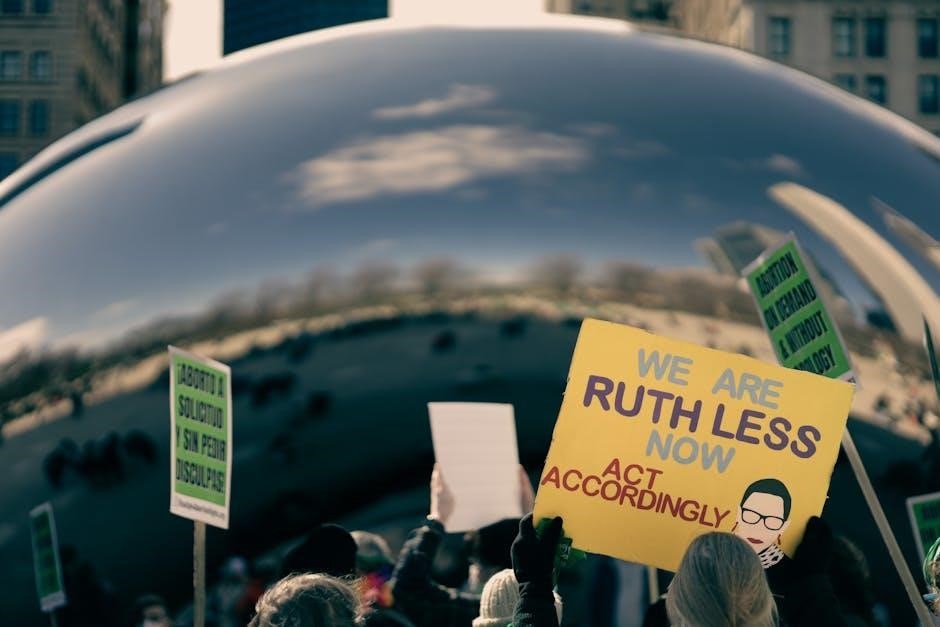Swami Vivekananda’s historic speech at the 1893 Parliament of Religions in Chicago introduced Hinduism to the West, emphasizing universal acceptance and tolerance, leaving a lasting global impact.
1.1 Historical Context of the Speech
Swami Vivekananda delivered his iconic speech on September 11, 1893, at the World’s Parliament of Religions in Chicago. This event marked the first time Hinduism was introduced to the Western world on such a grand scale. Held during the Columbian Exposition, the Parliament aimed to foster interfaith dialogue and understanding. Vivekananda, representing India and Hinduism, stood out as a young monk who captivated the audience with his powerful oration. His speech emphasized tolerance, universal acceptance, and the unity of all religions, resonating deeply in a world grappling with colonialism and religious conflicts. This moment marked a turning point in global spiritual history, establishing Vivekananda as a pivotal figure in modern spirituality.
1.2 Significance of the Speech in Modern Times
Swami Vivekananda’s Chicago speech remains a powerful beacon of unity and tolerance in modern times. Its emphasis on universal acceptance resonates deeply in today’s diverse world, fostering dialogue across cultures and religions. The speech’s message of harmony and mutual respect continues to inspire global leaders and movements. Prime Minister Narendra Modi has often referenced its relevance, highlighting its enduring impact on promoting peace and understanding. Its legacy endures as a call to action for humanity to embrace diversity and strive for a more inclusive world. The speech’s timeless wisdom continues to shape modern thought and spirituality.

Overview of the Chicago Speech
Delivered on September 11, 1893, at the Art Institute of Chicago, Vivekananda’s speech introduced Hinduism to the West, emphasizing tolerance and universal acceptance in just six minutes.
2.1 Date and Venue of the Speech
Swami Vivekananda delivered his historic speech on September 11, 1893, at the Art Institute of Chicago. This venue was chosen as part of the World’s Parliament of Religions, a groundbreaking event during the World’s Columbian Exposition. The speech took place in the presence of thousands of delegates and spectators, marking a significant moment in interfaith dialogue. The location and date underscore the importance of the event, as it brought global attention to Hinduism and India’s spiritual heritage.
2.2 Key Themes and Messages
Swami Vivekananda’s speech centered on universal acceptance and tolerance, emphasizing that all religions are true and deserving of respect. He highlighted Hinduism’s core principles, such as the interconnectedness of all faiths, comparing them to streams merging into a single sea. Vivekananda advocated for harmony, urging humanity to embrace diversity and recognize shared spiritual goals. He condemned sectarianism and fanaticism, which he saw as obstacles to progress. His message of unity and peace resonated globally, inspiring a vision of religions coexisting in mutual respect and fostering a world free from conflict and division.
2.3 Structure of the Speech
Swami Vivekananda’s Chicago speech was structured to captivate and inspire. It began with a heartfelt acknowledgment of the warm welcome, expressing gratitude on behalf of Hinduism and its people. He then transitioned to the core message of universal acceptance, emphasizing the unity of all religions. The speech also highlighted the importance of tolerance and harmony, drawing parallels through metaphors like rivers merging into the sea. Concluding with a powerful call to action, Vivekananda urged humanity to move beyond sectarianism and embrace a shared spiritual journey. The speech was concise yet profound, lasting just six minutes but leaving an enduring impact.

Main Content of the Speech
Swami Vivekananda’s speech introduced Hinduism to the West, emphasizing universal acceptance, harmony, and the unity of all religions, leaving a profound and lasting global impact.
3.1 Welcome Response and Gratitude
Swami Vivekananda began his speech with a heartfelt response to the warm welcome he received, expressing joy and gratitude. He thanked the audience in the name of India’s ancient order of monks, the mother of religions, and the millions of Hindu people. His opening words reflected India’s tradition of acceptance and harmony, setting the tone for his message of universal tolerance and unity. This gracious acknowledgment showcased his humility and appreciation, emphasizing the significance of the moment for Hinduism and global religious dialogue.
3.2 Emphasis on Universal Acceptance
Swami Vivekananda’s speech prominently featured the concept of universal acceptance, highlighting Hinduism’s belief in the unity of all religions. He famously likened diverse religious paths to rivers flowing into the same sea, emphasizing that all lead to the same divine truth. Vivekananda stressed the importance of accepting and respecting all faiths, rejecting sectarianism and exclusivity. This message resonated deeply, challenging the prevalent mindset of religious superiority and advocating for a world where diverse traditions coexist harmoniously. His words underscored the timeless relevance of mutual respect and understanding in fostering global unity.
3.3 The Role of Tolerance and Harmony
Swami Vivekananda’s speech underscored the vital role of tolerance and harmony in fostering global unity. He criticized sectarianism and fanaticism, which he believed had plagued humanity, and advocated for mutual respect among all religions. Vivekananda emphasized that diverse faiths, like streams flowing into the same sea, ultimately lead to the same divine truth. He urged the audience to embrace diversity and recognize the shared humanity that unites all beings. His message of harmony resonated deeply, inspiring a vision of a world where tolerance prevails, and peaceful coexistence is achievable. This call for unity remains a cornerstone of his legacy.
3.4 Concluding Address and Call to Action
In his concluding address at the Chicago Parliament of Religions on September 27, 1893, Swami Vivekananda expressed deep gratitude to the organizers and audience for their warm reception. He acknowledged the diversity of thoughts shared and reiterated the importance of harmony over discord. Vivekananda called for a world where religions coexist peacefully, urging humanity to move beyond sectarianism and embrace unity. His final words were a powerful appeal for global brotherhood, leaving an enduring legacy of peace and mutual understanding. This call to action continues to inspire people worldwide to strive for harmony and collective progress.

Legacy of the Chicago Speech
Swami Vivekananda’s Chicago speech is celebrated in India as a national event, symbolizing global unity. It continues to inspire harmony, fostering “Vasudhaiva Kutumbakam” worldwide.
4.1 Impact on Global Religious Harmony
Swami Vivekananda’s speech at the 1893 Parliament of Religions in Chicago was a landmark moment for global religious harmony. By advocating for universal acceptance and tolerance, he bridged cultural and religious divides, showcasing Hinduism’s inclusive ethos. His words resonated worldwide, inspiring movements toward interfaith dialogue and mutual respect. The speech’s emphasis on shared humanity and the unity of all religions continues to influence efforts for peace and cooperation among diverse faith communities, making it a cornerstone of modern interfaith understanding and harmony.
4.2 Influence on Modern Thought and Leadership
Swami Vivekananda’s Chicago speech has profoundly influenced modern thought and leadership by advocating for tolerance, harmony, and universal acceptance. His message inspired global unity, shaping contemporary leaders’ approaches to cross-cultural understanding. The speech’s emphasis on the inherent divinity of all individuals has fostered ethical leadership and social responsibility. Its ideals continue to resonate, encouraging leaders to embrace diversity and promote inclusive progress. Vivekananda’s vision of a harmonious world remains a guiding force, influencing movements for peace, education, and youth empowerment, ensuring his legacy endures as a beacon of progressive thought.
4.3 Commemoration and Celebrations
Swami Vivekananda’s Chicago speech is annually commemorated on September 11, marking its historic delivery in 1893. Prime Minister Narendra Modi has praised its relevance, emphasizing its role in fostering global unity. Cultural events, lectures, and youth programs in India celebrate this occasion, honoring Vivekananda’s vision. The speech is also marked digitally, with its PDF widely downloaded and shared worldwide. This celebration underscores its enduring impact, inspiring future generations to embrace tolerance and harmony, making it a cornerstone of national pride and spiritual reflection.

Technical Details of the PDF
The PDF contains 11 pages, sized at 46 KB, uploaded on August 23, 2022, categorized under General, in English, sourced from Drive Files.
5.1 Specifications of the PDF File
The PDF document of Swami Vivekananda’s Chicago speech is concise, comprising 11 pages with a file size of 46 KB. Uploaded on August 23, 2022, it is categorized under General and written in English. The content is sourced from Drive Files, ensuring accessibility and reliability. The file is optimized for easy downloading and reading, making it suitable for various devices. This version preserves the original speech’s essence, maintaining its historical and philosophical significance. The PDF’s compact size ensures quick access without compromising content quality.
5.2 Sources and Availability
The PDF of Swami Vivekananda’s Chicago speech is widely available from reputable sources like Drive Files and InstaPDF. It can be freely downloaded from platforms such as archive.org and other educational websites. The file is accessible in multiple formats, including PDF and text, ensuring compatibility with various devices. Additionally, translations in languages like Tamil are available, catering to a diverse audience. This ease of access makes the speech readily available for global readers, preserving its timeless message for future generations. The PDF is shared under creative commons, promoting free distribution and study.
Swami Vivekananda’s Chicago speech remains timeless, inspiring global harmony and leadership. Its themes of universal acceptance and tolerance are as relevant today as in 1893. Explore the PDF to delve into its profound insights and continue the journey towards unity and understanding.
6.1 Final Thoughts on the Speech’s Relevance
Swami Vivekananda’s Chicago speech remains a beacon of universal truth and harmony, transcending time. Its emphasis on tolerance, acceptance, and the interconnectedness of all faiths continues to inspire global unity. Delivered in 1893, the speech not only introduced Hinduism to the West but also laid the foundation for modern interfaith dialogue. Its relevance endures as it addresses contemporary challenges like religious conflict and societal division. The speech’s timeless appeal lies in its call for compassion, understanding, and the recognition of a shared humanity, making it a powerful guiding light for future generations.
6.2 Encouragement to Explore the PDF
Exploring the PDF of Swami Vivekananda’s Chicago speech offers a profound opportunity to delve into his visionary ideas. This concise yet powerful document encapsulates his message of universal acceptance and harmony. Readers can discover the full text of his historic address, gaining insights into his philosophy of tolerance and interconnectedness. The PDF is a valuable resource for anyone seeking inspiration or a deeper understanding of interfaith dialogue. Easily accessible, it provides a timeless guide for fostering global unity and personal growth, ensuring Vivekananda’s legacy continues to inspire future generations.
